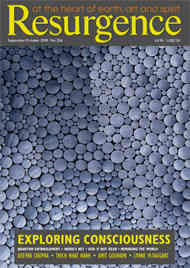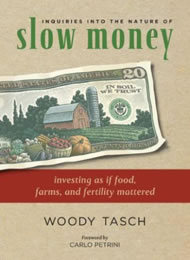Land is available for agriculture. Materials are available for building and industry. Labourers, skilled workers and designers are all waiting. Only finance has collapsed, and Woody Tasch wants to define a more appropriate place for it in society: “We live in a world of ever-depleting resources,” he says. “Money is no longer the currency. Air and water and soil are the currencies of the future.”
Money grew slowly. From the beginning of history to 1900 the world economy rose to US$600 billion in annual output, but recently it has been increasing by this amount every two years. Fractional reserve banking in private hands started the rot by allowing money to create money and separate it from real enterprise. Electronics then rocketed money into the stratosphere. Politicians and economists, trapped in their myopic vision, still see yet more growth – low-carbon growth being the new mantra – as the solution.
Tasch wants to bring economics down to Earth – to the soil. He mentions that the homo of homo sapiens derives from the Latin humus, ‘living soil’. Leonardo da Vinci wrote: “We know more about the movement of the celestial bodies than about the soil under our feet.” Charles Darwin studied earthworms in both his early and late years, recognising their importance in slowly and continuously serving the soil’s nutrition. In 1898 Nathaniel Shaler prophesied that, “If [hu]mankind cannot devise and enforce ways of dealing with the Earth that will preserve the source of life, we must look forward to a time when our kind will fade from the Earth.”
Farmers, driven by the economy, no longer tend the soil but are finance-controlled businesses using monoculture, hybrids and scrambled genes together with chemicals sprayed from tractors and aeroplanes. The result? Every second, tonnes of topsoil are carried by America’s rivers into the Caribbean, and what is left has lost a third of its organic matter. Life is speeded up by trains, cars and aeroplanes but the faster we go the less we see. “The depth of our understanding”, says Tasch, “is inversely proportionate to our velocity.” Thoughts like these open the book.
Tasch does not prescribe specific policies. Slow Money is more a meditation on the place of money in society. Don’t expect formulae. A new attitude is required towards the way we can achieve security and satisfaction without harm. Aristotle had two words for ‘economy’: first, oikonomia, management of the household – forget it, this is much too boring for the modern banking world – then chrematistics, wealth defined in terms of money, which is our economists’ only interest. But it is Aristotle’s first definition, in which decision-making is not driven by finance, that matters.
Tasch is chairman of an investors’ circle that facilitates the flow of US$130 million to 200 companies. A money-man, you could say, but one for whom money serves oikonomia. His ideas revolve around principles like rebuilding communities, linking millions with thousands of locally rooted companies and rewarding investors for low turnover. 50% of the profits would be used to strengthen ‘the household’, investing in not just organic food, but local organic food, local renewable energy installations and community development ventures. He says that beyond a certain scale companies lose allegiance to any particular place and become beholden to unfettered capital, so his new Slow Money organisation has established an appropriate scale as part of eligibility for listing. The idea is attracting substantial financial interest because, instead of the gamble with paper money that swings between huge returns and huge crashes, this slow long-term investment sustains the activity of communities with real needs and real enterprises.
You won’t be bored with too much talk of money. Tasch is a poet with an eye for beauty. There is something beautiful in koumiss at the market in Osh, in cochayuyo harvested from the sea by the women of Pichilemu, in the bokhan bread of Kobrin. There is nothing beautiful about bovine growth hormone or high-fructose corn syrup, or a McDonald’s parking lot.
Tasch explores what lies beyond the Era of Economics. We need to let our imagination wander, to dream, to hover around possibilities. The new economics will come from a deeper understanding of humanity and our place in the global ecology. •








